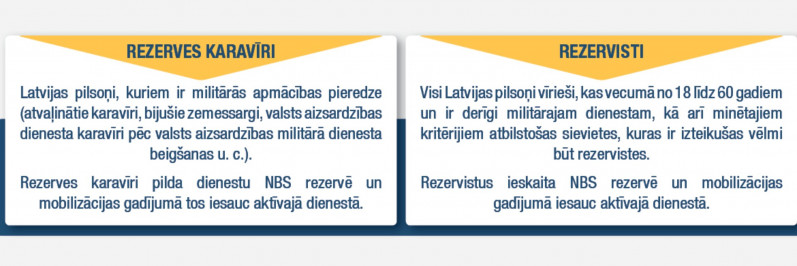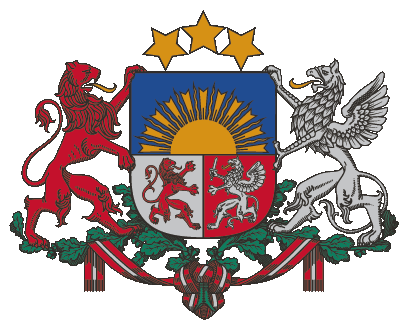
In the NATO defence system, the reserve force of the armed forces of the Member States plays a key role because no country can create such a large professional army that it can do without reserve forces in a situation of national threat. Given the role of the reserve force in the armed forces, the State Audit Office of Latvia assessed how the National Armed Forces (NAF) reserve system worked in a performance audit. One can conclude that other development priorities of the NAF have been in the foreground after the introduction of the professional military service in 2007, and targeted steps for the further development of the reserve force system have been missing until now. Therefore, the NAF reserve force system must be developed rapidly and purposefully.
BRIEFLY
- The operation of the NAF reserve force system should be improved. After the transition to the professional military service in 2007, the reserve force system was not purposefully developed.
- It is important to create a training system that allows reserve soldiers to maintain their military skills and abilities regularly and to provide modern data records that allow quick and easy access to reserve staff.
- For comprehensive national defence, it is essential that the largest possible part of society has acquired the knowledge and skills necessary for national defence.
- At the NATO level, there is no standard for the organization of reserve forces because it is determined by the Member States themselves. In recent years, Latvian national defence concepts have been moving towards the development of a reserve force system.
“Taking into account the current security challenges, improving the operation of the reserve force system is crucial, that is, to create a training system that would allow reserve soldiers to maintain their military skills and abilities regularly and to create modern data records that would allow quick and convenient access to reserve personnel at any time. State Defence Service implementation is a favourable time to organise the reserve force system, as a significant number of soldiers who have acquired military skills will join the NAF and will need both to maintain and develop the newly acquired skills, as well as to ensure the connection with the NAF after the completion of the national military service,” emphasized Ms Kristīne Jaunzeme, Council Member of the State Audit Office of Latvia.
The NAF reserve force is one of the three military formations that constitute the NAF together with the regular forces (professional soldiers) and the National Guard. The NAF reserve force consists of Latvian citizens subject to military service - reserve soldiers and reservists. Reserve soldiers are those citizens of Latvia who have military training experience (retired soldiers, former national guards, soldiers of the national defence service after completing national military service, etc.). In their turn, reservists are all male citizens of Latvia between the ages of 18 and 60 who are fit for military service, as well as women who meet the mentioned criteria and have expressed their desire to be reservists. Although both categories differ in terms of military training and peacetime duties, both are called up for active duty in the event of mobilization. Read more in informative material about the reserve force.
Unlike reserve soldiers who have military experience, reservists do not have military training until they are called up in the event of mobilization but reservists are expected to participate in the defence of the country in situations of national threat. Therefore, the generally accepted practice is to work with the reserve force even in peacetime, training as much of the population as possible in military skills and building up readiness for mobilization. Human resources are an essential part of mobilization and a large part of society whose daily life is not connected to defence would join the NAF in the event of mobilization.
“To ensure comprehensive national defence and create a culture of readiness for action, it is also important that opportunities are created to acquire knowledge and skills useful for national threat and crisis situations, how to take care of themselves, family, community and country for as large a part of society as possible,” noted Kristīne Jaunzeme.
The audit has concluded that when creating the reserve force system, attention was mainly paid to the numerical increase of the reserve force staff and less resources were devoted to the quality issues of the reserve force, which are essential for the reserve to be able to contribute to the fulfillment of NAF tasks until now. At the same time, the organization of volunteer training for reservists since 2018 is positively evaluated, in which interest has increased especially after the Russia’s invasion of Ukraine and in which volunteer reservists have the opportunity to learn military skills.
Expeditiously obtainable accurate data is important for conscripting reserve soldiers and reservists into active military service. The auditors point to several challenges and necessary improvements related to maintaining up-to-date information on reserve force staff, as well as using this information when analyzing readiness of reserve force.
The NATO does not set a standard for the organization of reserve forces. Member States are free to determine the relationship between active duty and reserve force staff, the role of reserve forces, and their training, equipment, and peacetime employment.
The experience of other countries analysed during the audit shows that other countries take targeted measures for the development of the reserve force system of the armed forces and the renewal of reserve personnel. Namely, the countries do not rely only on a voluntary approach to the creation of the reserve force anymore, and find solutions for the effective involvement of the reserve force in the tasks of the armed forces: (1) by restoring the mandatory conscription into military service, (2) by making extensive use of the available civilian skills, (3) by structuring the composition of the reserve force according to the level of preparedness and separating the active part of the reserve force, thereby concentrating training and recording resources on a specific part of reserve force, (4) by developing a long-term conceptual vision, (5) by planning strategically and developing the reserve force of the armed forces as a cornerstone of national defence purposefully. For instance, the Canadian Armed Forces have introduced an effective approach to broader involvement of civic society; the British Armed Forces have developed a strategic long-term development vision of reserve force and communication with the public; Lithuania uses a special approach in the classification of reserve force staff and working with the active reserve force; Estonia plans the human resources available to the armed forces in the long term.
In general, today the reserve force is perceived more and more broadly by searching the ways to interact between the civilian and military sectors and how reserve force staff can contribute to the fulfillment of the tasks of the armed forces. Such cooperation allows both to strengthen the connection of the armed forces with the public and to reduce costs, since the armed forces can focus more on developing capabilities that require more extensive resources and have higher training requirements.
State Audit Office recommendations #PēcRevīzijas
The audit provides eight recommendations which the Ministry of Defence shall implement in cooperation with the National Armed Forces by (1) elaborating proposals for long-term development of reserve force, (2) defining principles for the training of all categories of reserve force, and (3) developing a reserve staff accounting system that meets modern requirements.
Ref: audit report
The audit report deals with the issues of NAF reserve force policy and the practice of NATO Member States in the maintenance and development of the reserve force of the armed forces. The report assesses the issue of the development of the reserve force system in Latvia’s defence policy, evaluates the implementation of reserve staff training and the registration and accounting of reserve staff established by the NAF. The report of the State Audit Office of Latvia drafted after the audit is not made public, as it contains information for service needs, taking into account the fact that issues about the number of reserve force staff, training and accounting are information related to national security, the combat readiness and capabilities of the NAF.
This audit on the reserve force system of the NAF is the final audit of the State Audit Office of Latvia in a series of performance audits on NAF staff. Previously conducted audits have assessed the staff issues of the of the National Guard and the professional military service of regular forces, “The effectiveness of the measures taken in the HR policy of the National Armed Forces” (2022) and “Has the funding allocated for the implementation of the first phase of the National Guard’s enhanced readiness subunits been used effectively?” (2020).
About the State Audit Office of Latvia
The State Audit Office of the Republic of Latvia is an independent, collegial supreme audit institution. The purpose of its activity is to find out whether the actions with the financial means and property of a public entity are legal, correct, useful and in line with public interests, as well as to provide recommendations for the elimination of discovered irregularities. The State Audit Office conducts audits in accordance with International Standards of Supreme Audit Institutions of the International Organization of Supreme Audit Institutions INTOSAI (ISSAI), whose recognition in Latvia is determined by the Auditor General.
100 years of AUDIT STRENGTH
On 16 August 2023, the State Audit Law turned 100 years old. With the adoption of this Law, the State Audit Office from a formal de facto institution founded on 2 December 1918 became a de jure independent, collegial supreme audit institution of the Republic of Latvia. The State Audit Office is one of the independent state institutions enshrined in the Satversme (Constitution) of Latvia. The Constitution was signed by Roberts Ivanovs as the secretary of the Constitutional Assembly, who was then confirmed as the Auditor General. He worked as the first Auditor General for 12 years. His signature confirmed the text of our Constitution alongside that of Jānis Čakste.
Additional information
Ms Signe Znotiņa-Znota
Head of PR and Internal Communication Division
Ph. + 371 67017671 | M. + 371 26440185 | E-mail: signe.znotina-znota@lrvk.gov.lv
